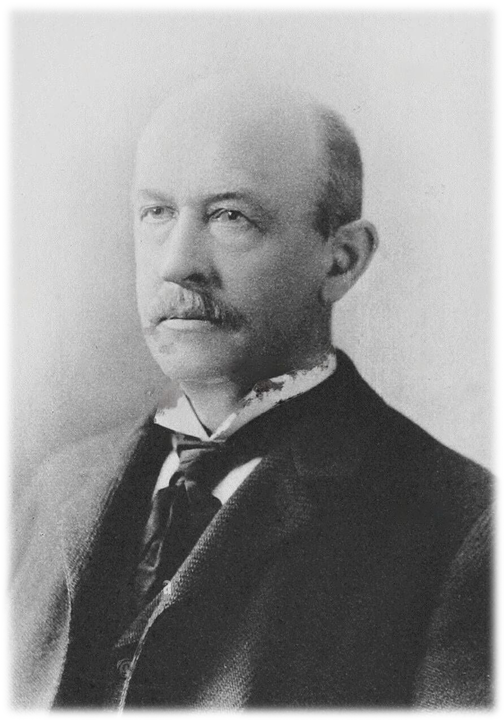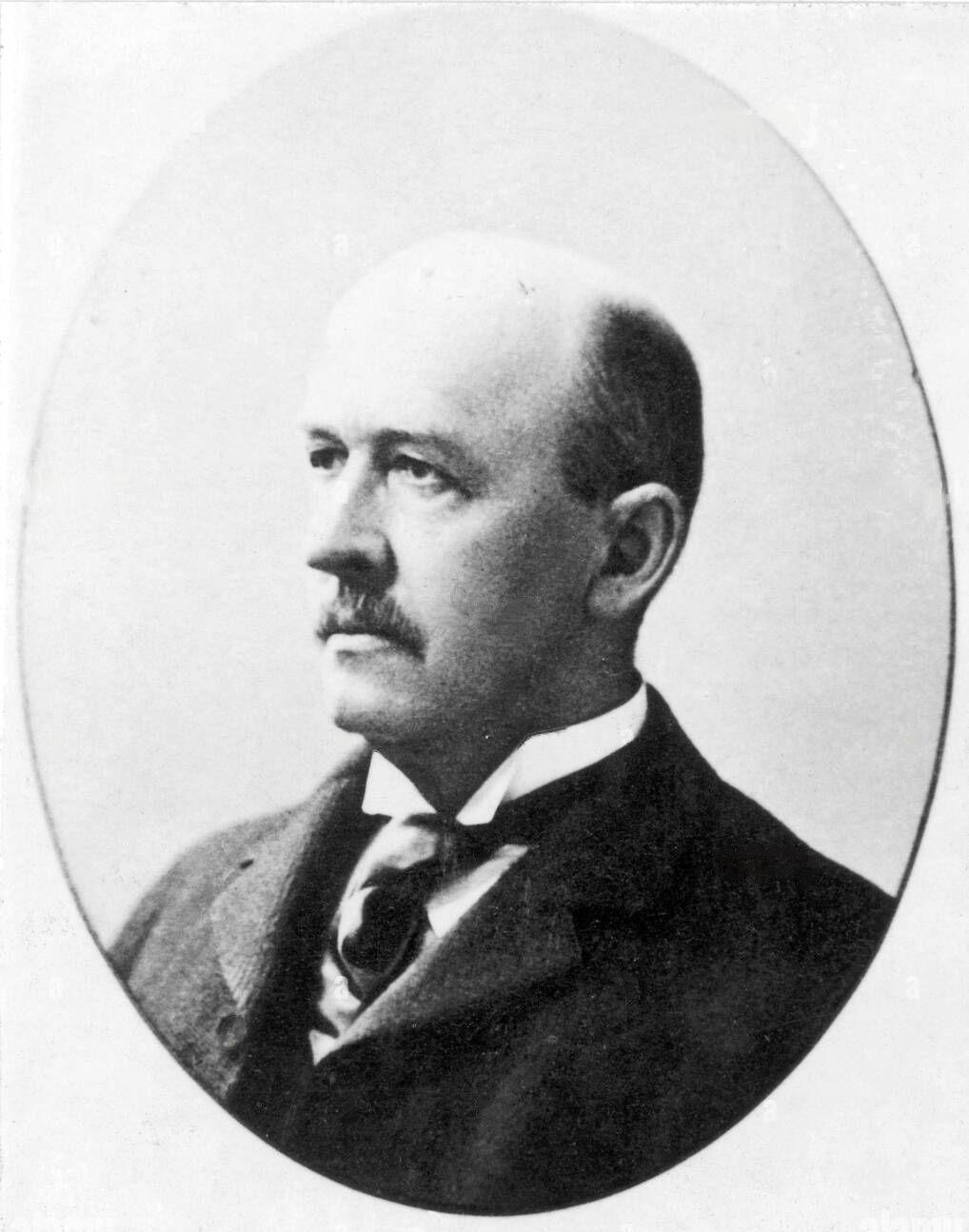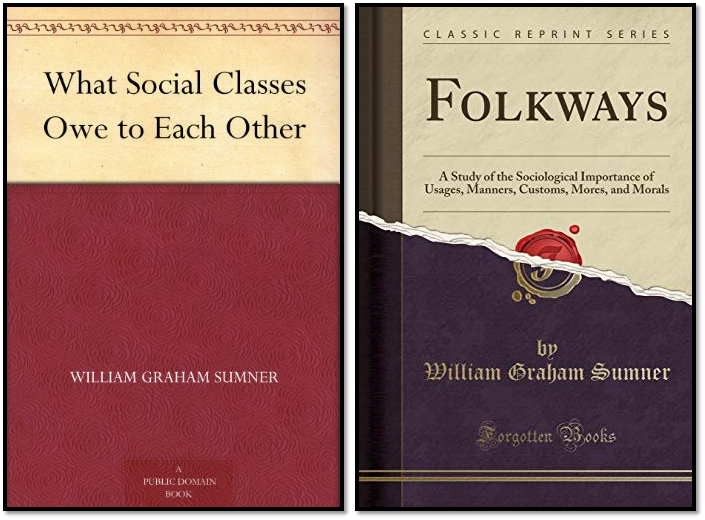William Graham Sumner
[1840-1910]
William Graham Sumner was an American historian, economist, and sociologist, famous for his strong support of laissez-faire economy, free markets, and anti-imperialism.
As a famous sociologist, what specific contributions have he made to society ? Get to know more about Sumner's life in the article below.
I. Introduction about William Graham Sumner biography
Sumner viewed the middle class as the cornerstone of an effective democratic capitalist society and opposed government intervention in the normal operation of social and economic activities.
He stated that democracy is in danger when the middle class is "forgotten." Sumner promoted Herbert Spencer's theory that people are constantly at odds with the environment and with one another over limited resources. However, he did not fully embrace social Darwinism and eventually gave it up.

1. Who is William Graham Sumner?
The son of English immigrants from the working class, Thomas Sumner and Sarah Graham, Sumner was born on October 30, 1840, in Paterson, New Jersey. Sumner was raised and educated in Hartford, Connecticut, where his family had relocated. Sumner's stepmother raised him and his two siblings after his mother passed away when he was eight years old. Sumner earned his honorary degree from Yale University in 1863 and joined the "Skull & Bones" society.
Sumner departed for Europe to pursue ministry studies after graduating. At Geneva and Göttingen, he studied languages, and at Oxford, he studied theology. He received priestly ordination in the Protestant Episcopal Church in 1869. He worked as a tutor at Yale at the same time. He worked as a tutor at Yale at the same time. After an able start to his ministry, Sumner accepted the position of rector of the Church of the Redeemer in Morristown, New Jersey, in 1870. He wed Jeannie Elliott in 1871, and the two had three sons together.
However, as he battled the tension between religion and scientific positivism, Sumner's interest gradually shifted from ministry to economics. He accepted a political and social science chair at Yale in 1872.
2. William Graham Sumner early career
When L.J. Henderson started teaching Pareto's work in a small seminar, Homans' interest in sociology got its start as a senior in college. William Graham Sumner was drawn to the notions of a social system and a scientific description of variables right once; this method would become his signature intellectual strategy throughout his career.
William Graham Sumner co-authored the 1934 publication An Introduction to Pareto with C.P. Curtis, two years after receiving his Harvard degree. In a groundbreaking industrial sociology study called the Western Electric study, he combined his love of this type of theory with a respect for field work that came from his experience working for Elton Mayo and a talented team that included Fritz Roethlisberger, whose field research abilities he particularly admired.
3. William Graham Sumner Style
Sumner employed vivid language throughout his entire professional life. He understood the power of plain Anglo-Saxon words as well as the subtle complexities of Latin words, as well as the best times to use each. For instance, he made his point on the first page of Folkways with the succinct statements, "The first task of life is to live," and "Men begin with acts, not with thoughts."
The Latin word "mores" suggests the involved justifications of the important customs of the people, whereas the word he coined, "folkways," has all the simplicity of the people who create folkways. The aleatory element, which was an aspect of man's most basic experience and was irrational and defied all expedient methods, was one of Sumner's impressive Latinisms.
To Sumner, sociology and anthropology were one discipline; however, even at the time of the publication of Folkways, American sociology, with Ward, Giddings, Small, Cooley, and Thomas, was taking the psychological turn it had been following for decades, and American anthropology was starting to follow the path Boas had begun to hew for it.
II. William Graham Sumner Major Works
Even though William Graham Sumner was a polymath who wrote in the fields of sociology, history, economic theory, anthropology, politics, and other social fields, his contributions to economics and sociology continue to garner the majority of his fame.

1. William Graham Sumner on Economics
Sumner's extreme laissez-faire stance and opposition to any government actions that disrupt the free market's inherent economics are what define his economic philosophy. He held that middle-class society is the foundation of both capitalism and democracy, and that as a result, the entire society depends on it. He wrote, expressing sympathy for the middle class:
The man who was ignored... He works, votes, and generally prays, but his main priority in life is to make ends meet.
According to William Graham Sumner, the middle class is constantly threatened by the greed of the wealthy elite and the self-interests of the poor masses. He asserted:
Most charitable or humanitarian schemes follow this type and formula: A and B collaborate to determine what C will be required to do for D. From a sociological perspective, the fundamental flaw in all of these plans is that C isn't given a say in the situation, and his position, character, and interests—as well as how those interests will ultimately affect society—are completely ignored. I refer to C as the Forgotten Man.
Due to the power shift toward a wealthy minority and the obstruction of free trade, William Graham Sumner believed that corporate monopolies pose a threat to social equality and democracy. Sumner's criticism of political corruption and his numerous essays on the peril of plutocracy were influenced by his own experience as a member of the committee to investigate irregularities in the presidential elections in New Orleans:
Plutocracy is the main threat to democracy today and in the near future. Every year that goes by makes this conflict more obvious. It will be the social conflict of the 20th century. Imperialism, militarism, and expansion will all support plutocracy in that conflict.
First off, war and expansion will encourage jobbery both at home and in the dependencies. In addition, they will divert public attention away from what the plutocrats are up to.
Secondly, they will cause significant outlays of tax dollars, the proceeds of which will not go to the Treasury but rather to a select group of con artists.
Thirdly, they will advocate for high taxes and a large public debt, both of which have a tendency to exacerbate male inequality because they disproportionately burden the weak while strengthening the strong.
Therefore, imperialism and expansion are a massive assault on democracy. Spain's 1899 invasion of the United States. William Graham Sumner disagreed with the Spanish American War and the ensuing American effort to put an end to the insurgency in the Philippines, just like many other classical liberals of the era, such as Edward Atkinson, Moorfield Storey, and Grover Cleveland. He served as vice president of the Anti-Imperialist League, an organization that was created following the war to fight against the annexation of territory. Sumner predicted that imperialism would establish a new class of "plutocrats," or businesspeople, who were reliant on government contracts and subsidies. The danger to democracy would then arise.
2. William Graham Sumner on Sociology
One of the founding fathers of American sociology is frequently regarded as William Graham Sumner. He was influenced by Scottish moral philosophers from the eighteenth century, particularly Adam Smith, Thomas Reid, and Dugald Stewart. His 1906 book Folkways investigated the origins of social history while attempting to derive broad principles of social change.
Sumner developed concepts like diffusion, folkways (social norms related to daily life that are not regarded as having moral significance by members of the group), and ethnocentrism as he traced the development of human customs and mores. He believed that all social behavior follows natural laws as a result of his research. Any change that is brought about by the government is therefore useless because social laws have natural cycles.
Social laws evolve naturally as a result of evolution.Sumner opposed all governmental reforms, contending that the best type of society is one based on laissez-faire principles. Only in an environment devoid of interference from the government could humanity survive. He was very critical of communism and socialism.
Sumner, who is frequently credited as the founder of Social Darwinism, supported his sociological and economic theories with this theory. He accepted Herbert Spencer's view that people compete with one another and with nature for limited resources and was one of Spencer's most ardent supporters. However, he distinguished between the "competition of life," in which people competed with one another in society, and the "struggle for existence," in which man struggled against nature. He asserted that as the population of the earth increased, resources became depleted, forcing people to adjust to new conditions. Higher intelligence, virtue, or efficiency give one the upper hand; those without would have to move in search of resources.
Sumner, in contrast to Spencer, did not think that evolution is a simple process that advances steadily over time. He became one of the few American scientists of the late nineteenth century to do so by rejecting the idea that human society changes. Instead, he proposed the theory that both the laws of the universe and the laws of society follow cyclic motion of development and decline. This theory was based on his interpretation of Darwinian and Malthusian theory as well as the principle of entropy. Sumner had categorically rejected social Darwinism by the time of his career's end.
In terms of gender roles and women's rights, he supported the family and favored gender equality. He fought for women's rights, more compassionate treatment of prostitutes, and a more liberal divorce law, challenging the stable Victorian consensus on sexuality.
III. William Graham Sumner Death & Legacy
1. Where was William Graham Sumner buried?
In the 1890s, Sumner's health deteriorated, and he withdrew from public life. He returned in 1899, joining the Philippine Independence Committee and rising to the position of vice president of the Anti-Imperialist League. William Graham Sumner completely shifted his attention to sociology and began investigating social phenomena. This time period produced his well-known book Folkways (1906).
After suffering a stroke in 1907, Sumner was able to recover and carry on with his work at Yale. In 1908, he was chosen to lead the American Sociological Society as its second president, a position he held for two years. On April 12, 1910, Sumner passed away in Englewood, New Jersey.
2. William Graham Sumner Legacy
Indelible traces of William Graham Sumner remain in American sociology. He was one of the pioneers of modern sociology, moving the field away from philosophical presumptions and toward empirical research. His contributions helped establish sociology as a legitimate scientific field. Folkways and ethnocentrism, two of Sumner's sociological concepts, are still widely used in the field.
The development of contemporary economic theories was aided by Sumner's economic theories. Thorstein Veblen, an economist, and Albert Galloway Keller, who edited and published several volumes of Sumner's writings, were among his pupils.
IV. William Graham Sumner Books
There are "about 300 items" in Sumner's body of work, which includes books and articles on "economics, political science, and sociology." Here are some of his famous books :

1. What Social Classes Owe to Each Other
This political and economic treatise, which was written in 1883, is even more relevant today than it was when it was first published. William Graham Sumner promotes individual rights over those of the government and formal pressure groups. He outlines the crucial part that the "Forgotten Man" must play in the advancement of our society and economy.\
2. Folkways - A Study of the Sociological Importance of Usages, Manners, Customs, Mores, and Morals
This work has been chosen by academics as having cultural significance and is a foundational piece of civilization as we know it. This copy of the original artifact is as accurate to the original as is humanly possible. Because most of these works were housed in our most revered libraries around the world, you will see the original copyright references, library stamps, and other notations in the work.
In the United States of America and possibly in other countries, this work is considered to be in the public domain. The body of the work is not subject to any entity's (individual or corporate) copyright, so you are free to copy and distribute it throughout the United States.
WHAT IS YOUR IQ?
This IQ Test will help you test your IQ accurately
Maybe you are interested
